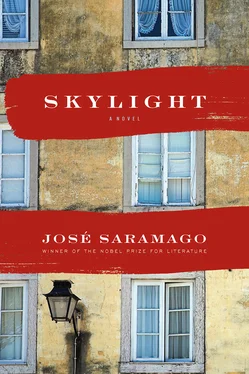She quickly untied her apron and put on her shoes and coat. She opened her own private drawer, took out a small piece of jewelry: an old gold brooch in the form of a fleur-de-lis. She scribbled a note on a scrap of paper: Had to go out. Make your own supper. Don’t worry, it’s nothing grave. Amélia.
It was almost dark by the time she returned, and she was so tired she could barely walk. With her she had brought a parcel, which she took to her room. She refused to say why she had gone out.
“But you’re exhausted!” cried Cândida.
“I certainly am.”
“Has something happened?”
“It’s a secret — for now anyway.”
Sitting down, she looked at her sister and smiled. Then she looked at Isaura and Adriana and continued to smile. And her gaze was so gentle, her smile so affectionate, that her nieces were touched. They asked more questions, but she silently shook her head, still maintaining that same gaze and that same smile.
They ate supper, then settled down for the evening. Trifling tasks filled the long, slow minutes. A woodworm could be heard gnawing away somewhere. The radio was silent.
At around ten o’clock, Amélia suddenly got up.
“Are you going to bed?” asked her sister.
Without responding, Amélia turned on the radio. The apartment filled with sounds as an inexhaustible torrent of chords burst forth from an organ. Cândida and her daughters looked up, surprised. The expression on Amélia’s face intrigued them. The same smile, the same gaze. Then, after one last phrase of baroque eloquence, the organ fell silent, like a cathedral collapsing in on itself. The silence lasted only a few seconds, then the presenter announced the next piece of music.
“Beethoven’s Ninth! Oh, how wonderful, Auntie!” exclaimed Adriana, clapping her hands like a child.
They all settled back in their chairs. Amélia left the room and returned a moment later, when the first movement had already begun. She had brought the parcel with her and placed it on the table. Her sister shot her an inquiring look. Amélia took down from the wall two of the portraits decorating it. Slowly, as if performing a special ritual, she unwrapped the package. Relegated to the background, the music continued to play. The rustle of paper drowned it out. Then the paper slipped to the floor and the mask of Beethoven appeared.
It was like the end of the final act of a play, except that the curtain did not fall. Amélia looked at Adriana and said, as she fixed the mask to the wall:
“Ages ago, I remember hearing you say that you’d like to have a mask of his face. I wanted to surprise you!”
“Oh, Auntie, that’s so sweet of you!”
“But how could you afford it?” asked Cândida.
“That doesn’t matter,” said her sister. “It’s a secret.”
When they heard that word, Adriana and Isaura glanced furtively at their aunt, but there was not a hint of suspicion in her eyes. There was only great tenderness, a tenderness that shone through what would have resembled tears — if Aunt Amélia had been the crying type.
“Abel’s taking a long time. Do you want to start your supper?”
“No, wait a bit longer.”
Mariana sighed:
“He might not come. I’m not sure that two people should wait for one…”
“If he wasn’t going to be here for supper, he’d have said. If you don’t want to wait, go ahead. I’m not that hungry.”
“No, nor am I.”
Hearing the front door open, they both jumped. When Abel appeared, Silvestre asked:
“So what happened?”
“Nothing.”
“You mean you didn’t get anywhere?”
Abel drew up a bench and sat down:
“I went to the office. I told the office boy I was a client and wanted to speak to Senhor Morais. I was ushered into a room and, shortly afterward, Senhor Morais joined me. As soon as I told him why I’d come, though, he immediately rang the bell for the office boy and told him to throw me out. I tried to explain, but he just turned on his heel and left. In the corridor I passed the young girl from the upstairs apartment, and she looked at me contemptuously. Anyway, the long and the short of it is, they put me out in the street.”
Silvestre thumped the table:
“Bastard!”
“That’s what he called me a little while ago when I phoned him at home. He called me a bastard and hung up.”
“So now what?”
“Well, if he wasn’t an old man, I’d go around and punch him in the face. As it is, I can’t even do that.”
Silvestre got to his feet and paced angrily up and down the kitchen:
“Life’s nothing but a dung heap, really, a great steaming pile of dung. So there’s nothing to be done, then?”
“I’m afraid not. I’ll just have to do what I have to do—”
Silvestre broke in:
“ Have to do? I don’t understand.”
“It’s quite simple. I obviously can’t stay here. All the neighbors know what happened. It would seem arrogant of me to stay. Besides, she’s not going to feel comfortable knowing I’m still here and knowing what the neighbors are saying.”
“You mean you want to leave?”
Abel gave a slightly weary smile:
“No, I don’t want to leave, but I must. I’ve found another room already. I’ll move my things out tomorrow. Please, don’t look at me like that!”
Mariana was crying. Silvestre went over to Abel, placed his hands on his shoulders and tried to speak, but failed.
“It’s all right,” said Abel.
Silvestre attempted a smile:
“If I was a woman, I’d be crying too. But since I’m not…”
He turned abruptly toward the wall, as if he didn’t want Abel to see his face. Abel got up and made him turn around:
“Come on now, you don’t want us all crying, do you? We can’t have that.”
“I’m just so sorry to see you go!” sobbed Mariana. “We’re used to having you here now. You’re like one of the family.”
Abel listened, greatly moved. He looked from one to the other and asked very slowly:
“Do you really think I should stay?”
Silvestre hesitated for a moment, then said:
“No.”
“Oh, Silvestre,” exclaimed his wife, “why not say yes? Then he might stay!”
“Don’t be silly. Abel’s right. It’ll be very hard for us, but there’s nothing we can do.”
Mariana dried her eyes and blew her nose loudly. Making an attempt at a smile, she said:
“But you will come and see us now and then, won’t you, Senhor Abel?”
“Only if you promise me one thing.”
“What? I’ll promise anything!”
“That you’ll stop calling me Senhor Abel and call me just plain Abel. Is that a deal?”
“It’s a deal.”
They felt happy and sad at the same time: happy because they loved each other, sad because they had to part. It was their last supper together. There would be others, of course, when things had calmed down and Abel could safely come back, but those suppers would be different. They would no longer be a gathering of three people living under the same roof and sharing their griefs and joys as if they were bread and wine. Their one compensation was the love they felt for each other — not the obligatory love one has for relatives, which is often a burden imposed by convention, but a spontaneous, self-sustaining love.
When supper was over and while Mariana was washing the dishes, Abel went off with Silvestre to pack his suitcases. They made short work of it, and with a sigh Abel lay down on the bed.
“Fed up?” asked Silvestre.
“What do you think? As if it wasn’t hard enough to deal with the bad things we do knowingly. As you see, just existing can be a bad thing too.”
“Or a good thing.”
Читать дальше












